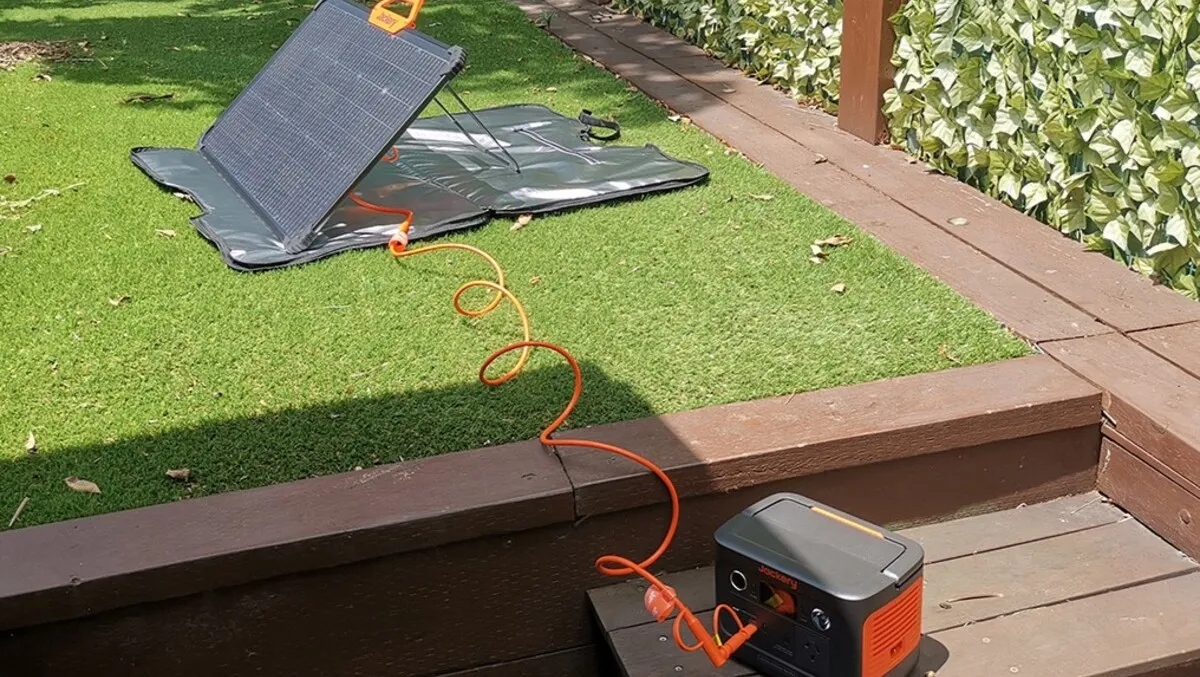
Hands-on review: Jackery Explorer 300 Plus portable power station and SolarSaga 80W solar panel
Jackery seeks to help keep the power on with the lightweight Explorer 300 Plus and SolaSaga 80W portable power station and solar panel.
Keeping your electrical equipment on when away from a power supply is easier than ever. Rechargeable battery technology is better and cheaper than ever. There are a load of portable power stations available, but most of them use the term "portable" a bit too liberally.
Lithium batteries are chunky-monkeys and if you want a weekend of power you are going to be carting around a box with the same weight as a small child. This is all good in the back of the car, but if you are hiking or camping overnight and just want to keep the lights on, you may want something smaller.
The Jackery Explorer 300 Plus really is a portable power station. It only weighs 3.75kg and is packed in a chassis that is only 230mm x 167mm x 155mm. There is even a carry handle.
In the box, you'll find a standard "kettle-lead" cable for charging the unit from the AC mains, a DC7909 to USB C adapter, an easy-to-follow user manual, and another user manual for the Jackery App.
For such a small unit, it is still fully featured. You have the standard ANZ three-pin AC socket, a 12V Car "cigarette lighter" output, 5V USB Type-C, and 5V USB Type-A outputs. There's another USB Type-C that functions as an input as well as in output up to 100W/20V. There's also a built-in light that functions as both a powerful touch and a flashing emergency beacon.
Pressing the power button turns on the unit and illuminates the LED screen. There are two other buttons for activating the AC and DC power supplies.
The LED screen allows you to keep track of the unit's charge, input, and output at a glance. The unit has Wi-Fi and Bluetooth, allowing its status to be checked via the Jackery App. The app does require signing up. This was a bit fiddley, but I'm not sure if they were having server issues when I was trying to sign up. Once up and running, I could check the unit remotely, which was especially handy when using solar charging. The direct Bluetooth connection is great for when to are away from your WiFi network.
Whilst it should come as no surprise, a small unit like this, at only 300W AC output you are not going to be boiling your water or doing the ironing. Check that the camping appliances that you are going to use together draw less than 100 watts combined.
The Explorer 300 Plus has a 22.5Ah 12.8V DC Lithium-ion battery. Rated at 300Wh, you are likely to get 2.5 hours of battery life with a 90 refrigerator, charge a laptop a couple of times, and a mobile phone 13 times. Not the greatest capacity, but it is only a small unit.
When you can, charging the unit via the included AC cable is the most efficient. You can also charge it via the 12V output in a car, although there was no cable for this included with the machine. If you are in the middle of nowhere. You are going to need at least one Jackery SolarSaga 80W solar panel.
The Jackery SolarSaga 80W solar panel comes in a zippered bag that doubles up as a reflector to get some sunlight to the underside of the double-sided panel. The panel feels quite sturdy but could easily be broken. At 5.1kg and measuring 906mmx528mx27mm, it'll add a significant additional weight to your expedition.
The attached 1m cable charge cable can be extended by a further 2m via the extension found in the bag's internal pocket. You will need to use the USB-C adapter that came with the Explorer 300 Plus to plug the panel into the power station.
With a max power of 80W at optimal charging conditions, it's not going to be quick, but likely quicker than using a car charger. In direct sunlight, I could easily see 70W of input. An overcast sky saw that drop to 25W or lower. Taking the time to correctly place the panel and regularly checking speeds up the charging cycle.at around 60W the device reported around 5 hours until fully charged.
Both the Jackery Explorer 300 Plus portable power station and SolarSaga 80W solar panel come with a three-year warranty. Priced at AUD$ 699 for the Explorer 300 Plus and AUD$459 for the SolarSaga 80W, they are not exactly cheap, but they are considerably cheaper than most portable power stations and solar panels. The power station can be packed in your rucksack, and the solar panel placed in the boot for sustainably charging your camp power station.
The Jackery Explorer 300 Plus portable power station and SolarSaga 80W solar panel is a great combo for anyone camping in an isolated place or just wanting to get into powering their camp in an environmentally friendly way.


